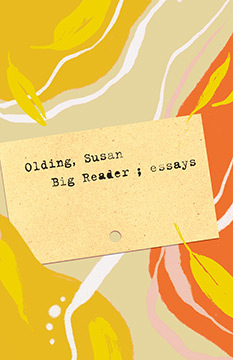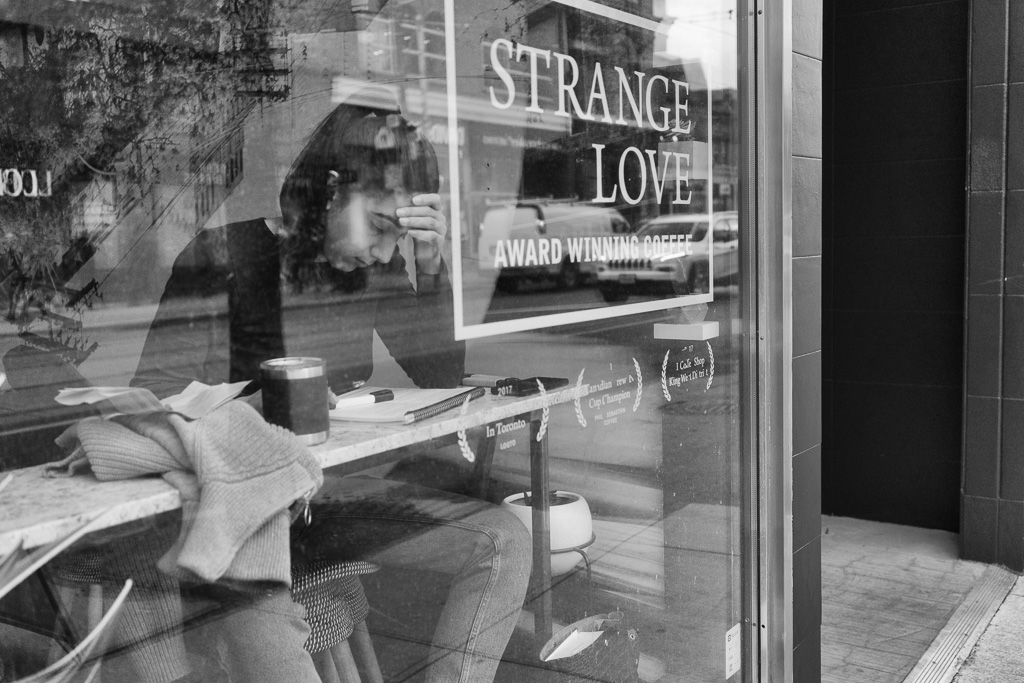Big Reader: essays, Susan Olding (Calgary: Freehand Books, 2021)
My father was a reading consultant for what was at that time the North York Board of Education. His job was promoting literacy which means that I grew up in the company of books. I have a distinct memory of the instant that letters first coalesced into a word. Not yet old enough for school, I was lying on my stomach on the concrete floor of our unfinished basement, copying words from one of my father’s exercise books. The text was in a typewriter font and I recall that I copied not just the letters but the details of the font, too. There came an instant—and it was just that; an instant—when there were no longer discrete letters on the page of an exercise book, a cahier, but a word, like the words that tumbled down my tongue and across my lips. I don’t remember it being difficult, there was no struggle, no effort, it just happened. There is something wonderful about the plasticity of a child’s mind.
I remember, too, how a man in jacket and tie would come to our house once a week and my father would tutor him. His was the opposite of a plastic mind. He was friendly enough and would say hi to my brother and me as we played hockey in the driveway, but it was obvious to us that this man struggled to perform simple operations that we took for granted. It was shocking to me that a man could reach adulthood and not know how to read. I couldn’t imagine a world without reading.
I remember how other men in jackets and ties came to meet with my father while I lurked in the corners, dying to know what was going on. It turns out there was nothing terribly secretive about the meetings and my father was happy to include me. They were editors from McGraw Hill Ryerson who wanted my father to ghost write a history text. Later, he pitched a series of four books—Wheels, Waves, Wind, and Winter—educational materials that teachers could use as reading resources. For years afterwards, he would get envelopes in the mail, quarterly royalty cheques, not large sums, but a nice supplement to his official salary. In total, his writing probably earned him enough to buy a new car. Not bad as a side line.
The thing about my father’s pedagogical approach to reading was that he had no single approach. Even today, he will roll his eyes if he catches someone saying to a young child struggling to read, “Just sound it out.” Sounding things out only works in a phonetic language like Latin and, to a lesser extent, the Romance languages. For historical and linguistic reasons, the English language is not a phonetic language and so a rule-based approached to reading is pointless because there are more exceptions than instances that conform to rules. My father held to the view that it was best not to be too dogmatic about things. If you get to kids young enough, they’ll acquire reading organically. Although purists might scoff at him, my father actively encouraged kids to read comic books. Words are everywhere, so, for instructional purposes, choose the words that interest the learner. Ad copy, crime reports in the news, trade magazines. Later in his career, my father gave workshops on using magic as a tool to promote literacy in the classroom. If kids want to perform magic tricks, then get them to develop patter to go along with the delivery of the tricks. What the kids don’t realize is that, in the development of patter, they use the same skills they need to write a story or an essay. The only difference is that they actually enjoy themselves as they learn the skill.

And so it’s with some delight that I encounter a kindred spirit in Susan Olding whose latest collection of essays, Big Reader, celebrates the reading life. Not unlike my father, Olding shares her reading with us through a variety of strategies. The first we might describe as confessional. In a painfully honest piece titled “In Anna Karenina Furs,” Olding relates the experience of embarking upon an extramarital affair to her reading of Tolstoy’s novel, Anna Karenina. Each informs the other. The novel supports her in her experience of moral complexity, confusion, and social stigma. At the same time, adult experience gives her a fresh appreciation for beloved characters and becomes the occasion for a re-evaluation of earlier readings. I think all committed readers have similar moments when our living overtakes and overwhelms our younger reading selves.
In “A Pilgrimage to Hempstead, or Household Pets of Great and Lesser Poets” Olding reflects upon literary tourism which has as its foundational premise the belief that if we place ourselves geographically in more or less the same position as the luminaries of the literary firmament, then we will gain some insight into what made them shine. Maybe they infused their surroundings with a residue of their inspiration and, if we visit those surroundings, we will be able to scrape some of that residue from the floor, the walls, the desk where they sat when they wrote their most stirring words. Olding begins with the death of her cat and turns to Keats for solace. Keats didn’t have a cat, but his neighbours did and they provided him with some amusement as he wrote or swooned or whatever it was he did when he set pen to paper. Olding recounts her pilgrimage to the house Keats occupied for a time on the outskirts of London, a disappointing experience, but not unexpected giving that Keats had embarked on a similar pilgrimage in honour of Robert Burns which proved likewise disappointing.
Although, rationally, the idea of a literary pilgrimage holds no water, I find myself dipping into the same pool when I read some of Olding’s other pieces, especially “A Different River” which is something of a paean to the city of Toronto and, more particularly, to places (and times) in Toronto that were formative for me. Her Toronto piece is the most tenuously related to the bookish life (Olding had come to Toronto to get into Ryerson’s journalism program and screwed up her interview by confessing that she wanted to get into journalism because she loved to write) and yet it is the most personally compelling because it visits familiar sites: Allen Gardens, St. James Town, the Don River, Readers Den across the road from Taddle Creek (Philosopher’s Walk). I’m not sure what the psychology is, but I find it somehow compelling to discover places in my quotidian existence that have mapped themselves onto the consciousness of writers like Olding.
Then we have the matter of writerly ethics in “Blood Typing” hearkening to her previous collection of essays, Pathologies, which I have earlier reviewed. Olding’s father, a pathologist, developed a terminal blood disorder, but because Olding and her father were estranged, there was no opportunity for a heartwarming straight-to-Netflix movie scene of family gathered around the deathbed. Olding had written frankly about her father’s alcoholism and, in response, her father refused to speak to her. It raises questions about what is and what isn’t fair game as material for a writer. A writer’s experience shapes her work; it cannot be otherwise. But inevitably that experience happens in the context of personal relationships. In terms of privacy, what does a writer owe to the other people in those relationships. If a right to privacy were absolute, no one could ever write anything. How do we negotiate our way between a respect for personal privacy and the need shared writing answers in helping us to make sense of our dealings with other people?
“Blood Typing” adds a second order question to this puzzle: what does a writer owe to the other people in those relationships after those people have died? I suspect that if there is such a thing as an afterlife, it doesn’t have heaven and hell, but a room for writers and room for everyone who has appeared in their work. Naturally, I favour the writers. If Susan Olding had heeded the scruples of a puritanical writerly ethic, we would never have the benefit of her insight and the richness of her words.
